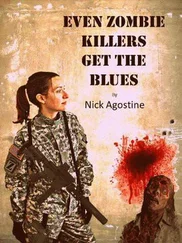I didn’t like the way this conversation was going, mainly because it made way too much sense. I stood up and gathered up the uneaten half of his sandwich and the unopened containers. “I’ll put this stuff in the refrigerator so you can have it later.”
“I appreciate your thinking of me, Dixie.”
“Look, you have to have somebody here. Ziggy has to be fed, you have to be fed. You have to let somebody come in and help you.”
“I was hoping that would be you.”
“I’m a pet sitter, not a nurse.”
“I’m more animal than human, so you’re highly appropriate. All the iguana and I need is a bit of food once a day. You could do that for us, couldn’t you? Just for a few days? Until Gilda returns?”
“What makes you think Gilda will come back?”
“Oh, she’ll be back. And soon. I’m sure of that.”
Now here’s the thing about being a little bit off-center—you’re never sure if you’re a bona fide loon or if you have insight that other people don’t have. You have to navigate through life using a kind of psychic gyroscope to keep from falling too far one way or another, and you feel a peculiar kinship with other people who are also a little bit off-center. Ken Kurtz was right. In some fundamental way, he and I were alike.
I said, “I’ll give you a few days, but if Gilda’s not back by the end of the week, you’ll have to make other arrangements.”
He made a sound halfway between a bitter laugh and a growl. “I wish it were that simple, Dixie.”
I didn’t ask what he meant by that. The house and the man were making me claustrophobic. I practically ran to the kitchen to stash Ziggy’s veggies and Ken Kurtz’s leftover food in the empty refrigerator. I had already crammed it on the shelves when it occurred to me that Guidry might have wanted the refrigerator to remain as Gilda had left it.
I could hear him in Gilda’s room talking to some crime-scene people. No doubt about it, he was treating Gilda’s disappearance as an important part of the murder investigation. I closed the refrigerator door and hurried to the living room and out the front door, pausing just long enough to log the time on the Contamination Sheet. Within seconds, I was in the Bronco and on my way home.
I didn’t know whether I was shivering from the cool air or from the sure and certain knowledge that I was too involved in something bizarre and dangerous.
EIGHT
Michael and I learned that our mother had left us for good when we came home from school one day and found our grandparents sitting side by side on the living room sofa. Something about their stiff postures alerted both of us that something had happened in the mysterious world of grown-ups. My grandmother was the one who told us. She just came right out with it, as if she had to say it fast and get it over with.
“Your mother has run off with a man she’s been seeing. He doesn’t want any children, and she wants him.”
My grandfather frowned and said, “I don’t think that’s necessary, Christina.”
“Yes, it is,” she said. “They need to know the truth of it.” She turned to us and said, “We’ve already packed your things. You’re going to live with us now, and I’m glad.”
The thing was that when my mother had been there, she was really there, so her absence was all the more glaring. With hindsight, I decided she had probably always wanted to leave but she had waited until after our father died, putting out a fire to save somebody else’s children. My mother never forgave him for dying. Perhaps she had never forgiven him for being a fireman.
At any rate, our grandparents took Michael and me in and finished doing what their daughter wasn’t willing or capable of doing herself. Like the rhythm of the sea, they never changed, and in their frame house overlooking the Gulf I felt I’d come to a place of stability and safety. When they moved on to wherever we go when we die, they left the beachside property to Michael and me. Michael and Paco moved into the house, and after Todd and Christy were killed I moved into the apartment over the carport, where the sound of the surf anchored me.
Driving home from the Kurtz house, I decided not to tell Michael and Paco about the morning’s bizarre events. They worried too much about me as it was, and Michael was still touchy about the man I’d killed. I guess no matter how old Michael and I get, he’ll always feel it’s his job to protect me. When he can’t, he feels guilty, and when he feels guilty he gets grumpy.
Turning off Midnight Pass Road, I eased down our twisting lane. As usual, flocks of wild parakeets blossomed from the mossy oaks, pines, and sea grape as I passed, circled overhead in a kind of mock frenzy, then zoomed back to their perches as if they’d had a wild moment of excitement they’d never had before. Parakeets are such drama queens.
When I nosed the Bronco under the carport, I mentally groaned when I saw Michael in front of the shelves of a storage closet. He was meticulously rearranging tools and all the little jars of nails and touch-up paint that men collect. There’s something about laying things out so they all face the same way or lining them up in alphabetical order that makes super-organized people feel better. Not being a particularly organized person, I’ve never arranged stuff like that in my life, but I still find things when I need them. Usually.
I slid out of the Bronco and said, “What’re you doing?”
He held up a jar of fish hooks. “Just sorting things.”
“Uh-hunh. Michael, how long’s it been since you used one of Granddad’s old hooks?”
“You never know when you might need something like that. You hungry?”
“I had a sandwich a little while ago.”
“You look funny. You looked funny when you were here before, too. What’s wrong?”
“It’s cold. I hate cold. I’m going to go take a hot shower.”
I left him staring after me and hurried upstairs, raising the metal security shutters with my remote as I went.
Michael yelled, “I have chili on the stove when you get hungry.”
I waved and smiled and opened the French doors. I kept the smile on my face all the way down the hall to the bathroom, as if Michael could see through walls. In the bathroom, I let the water turn steamy while I stepped out of my clothes, and then stood for a long time under water I was pretty sure was hot enough to kill germs. I even used germicidal soap. I didn’t know what was wrong with Ken Kurtz, but I knew enough biology to know his weird whirlpooling skin pointed to something systemic and neural. Whatever it was, I didn’t want it.
When I felt sufficiently decontaminated, I came out all red and hot, wrapped myself in a thick terry robe, and fell into bed and immediate dark sleep. I woke feeling a surprising clarity, as if the shock of the morning had put everything else into better perspective.
I mentally reviewed everything that had happened from the moment the phone call came from the man who claimed to be Ken Kurtz. I tried to recapture the timbre of the man’s voice, the rhythm of his words, the Irish accent with its lulling calmness that had made me trust what he said. At the time, I’d thought we had a bad connection, but now I wondered if the fuzzy sound had been because the man had been speaking through layers of fabric that made the voice less distinct.
For the first time, I wondered how he had got my number. Other than a small display ad in the monthly West Coast Woman, I don’t do any advertising. Half the time, I even forget to carry business cards. My business comes mostly from referrals, people I know well. And yet somebody had rejected all the pet sitters listed in the Yellow Pages and called me. Why?
With the question came the immediate answer. My name had been in the news just a few months ago when I’d killed that man, along with the information that I was a professional pet sitter. Somebody could have made note of the name and looked me up in the phone book. Maybe they’d thought I was a tough cookie, a former deputy who was a crack shot, a hard woman who didn’t flinch at killing and who therefore wouldn’t be sickened by Ken Kurtz.
Читать дальше












